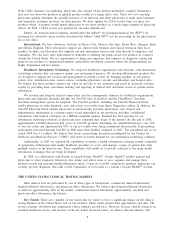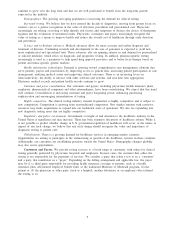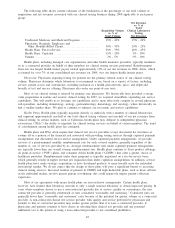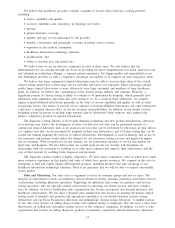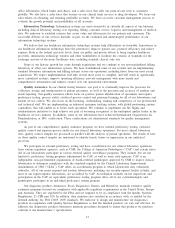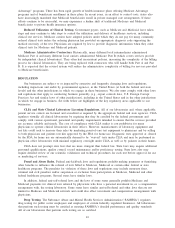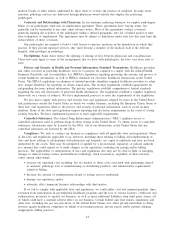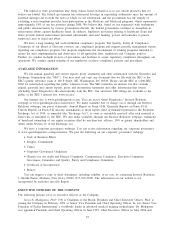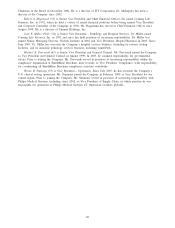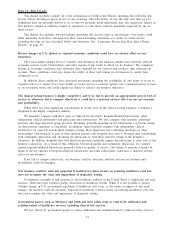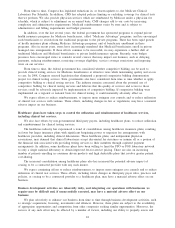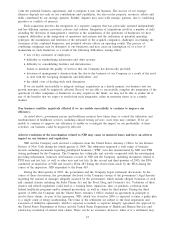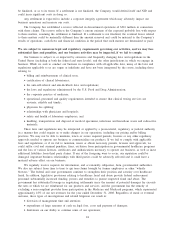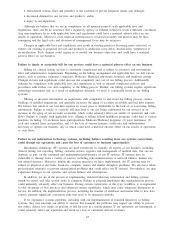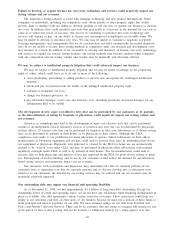Quest Diagnostics 2008 Annual Report Download - page 29
Download and view the complete annual report
Please find page 29 of the 2008 Quest Diagnostics annual report below. You can navigate through the pages in the report by either clicking on the pages listed below, or by using the keyword search tool below to find specific information within the annual report.Medical Waste, Hazardous Waste and Radioactive Materials. Clinical laboratories in the United States
are subject to federal, state and local regulations relating to the handling and disposal of regulated medical waste,
hazardous waste and radioactive materials. We generally use outside vendors to dispose of such waste and
contractually require them to comply with applicable laws and regulations.
FDA. The FDA has regulatory responsibility, among other things, over instruments, test kits, reagents and
other devices used to perform diagnostic testing by clinical laboratories in the United States. The FDA also
regulates clinical trials (and, therefore, testing that we perform for sponsors of those trials), drugs-of-abuse testing
for employers, testing for blood bank purposes and testing of donors of human cells for purposes such as in vitro
fertilization. A number of esoteric tests that are developed internally are first offered as laboratory-developed tests
(“LDTs”). In the past, the FDA has claimed regulatory authority over all LDTs, but stated that it is exercising
enforcement discretion in not regulating most LDTs performed by high complexity CLIA-certified laboratories.
However, the FDA has been petitioned to exercise regulatory authority over certain LDTs and to initiate
enforcement action against companies that make effectiveness claims about LDTs that are without sufficient
analytical and clinical support. In addition, the FDA has issued two drafts of a guidance document describing
certain LTDs as “In Vitro Diagnostic Multivariate Index Assays.” The FDA could finalize this guidance
document, clarifying its intention to regulate these tests as medical devices and the laboratories that offer this
subset of LDTs. If FDA regulation of this subset of LDTs occurs or if regulation of the various medical devices
used in laboratory-developed testing ensues, it would lead to an increased regulatory burden resulting in
additional costs and delays in introducing new tests, including genetic tests; this may hinder us from developing
and marketing certain new products or services.
In September 2007, the FDA finalized its Guidance relating to Analyte Specific Reagents (“ASRs”), which
laboratories use in their LDTs. As a result, manufacturers of certain products previously marketed as ASRs must
file for FDA clearance of these products in order to market them in the United States. Failure to act diligently
and to cooperate with the FDA may result in enforcement action against the manufacturer. The increased
regulation of these products could result in increased product cost, a delay in obtaining them or, if a
manufacturer withdraws its products from the market, an inability to obtain the product. These factors may hinder
us from developing and marketing new products or services or cause us to have to increase the cost of our
products or services.
Our diagnostic product business is subject to regulation by the FDA, as well as by foreign governmental
agencies, including countries within the European Union who have adopted the Directive on In Vitro Diagnostic
Medical Devices (“IVDD”). These agencies enforce laws and regulations that govern the development, testing,
manufacturing, labeling, advertising, marketing, distribution and market surveillance of diagnostic products. Prior
to marketing or selling most diagnostic products, currently we are required to secure clearance or approval from
the FDA and (when appropriate) counterpart non-U.S. regulatory agencies, although the IVDD allows us to
market in Europe many products using a process in which the manufacturer certifies that the device conforms to
the regulatory and quality requirements for the device. Following the introduction of a diagnostic product into the
market, the FDA and non-U.S. agencies engage in periodic reviews of the manufacturing processes and product
performance. Compliance with these regulatory controls can affect the time and cost associated with the
development, introduction and continued availability of new products. These agencies possess the authority to
take various administrative and legal actions against us for non-compliance, such as fines, product suspensions,
submission of warning letters, recalls, product seizures, injunctions and other civil and criminal sanctions. Where
appropriate, voluntary compliance actions, such as voluntary recalls, may be undertaken.
Occupational Safety. The federal Occupational Safety and Health Administration (“OSHA”) has established
extensive requirements relating specifically to workplace safety for healthcare employers in the United States.
This includes requirements to develop and implement multi-faceted programs to protect workers from exposure to
blood-borne pathogens, such as HIV and hepatitis B and C, including preventing or minimizing any exposure
through sharps or needle stick injuries.
Transportation. For purposes of transportation, some biological materials and laboratory supplies are
classified as hazardous materials and are subject to regulation by one or more of the following agencies: the U.S.
Department of Transportation, the U.S. Public Health Service, the United States Postal Service and the
International Air Transport Association.
Corporate Practice of Medicine. Many states, including some in which our businesses are located, prohibit
business corporations from engaging in the practice of medicine. In certain states, business corporations are
prohibited from employing licensed healthcare professionals to provide services on behalf of the corporation;
these laws vary from state to state. The manner in which licensed physicians can be organized to perform
medical services may be governed by the laws of the state in which medical services are provided and by the
17



